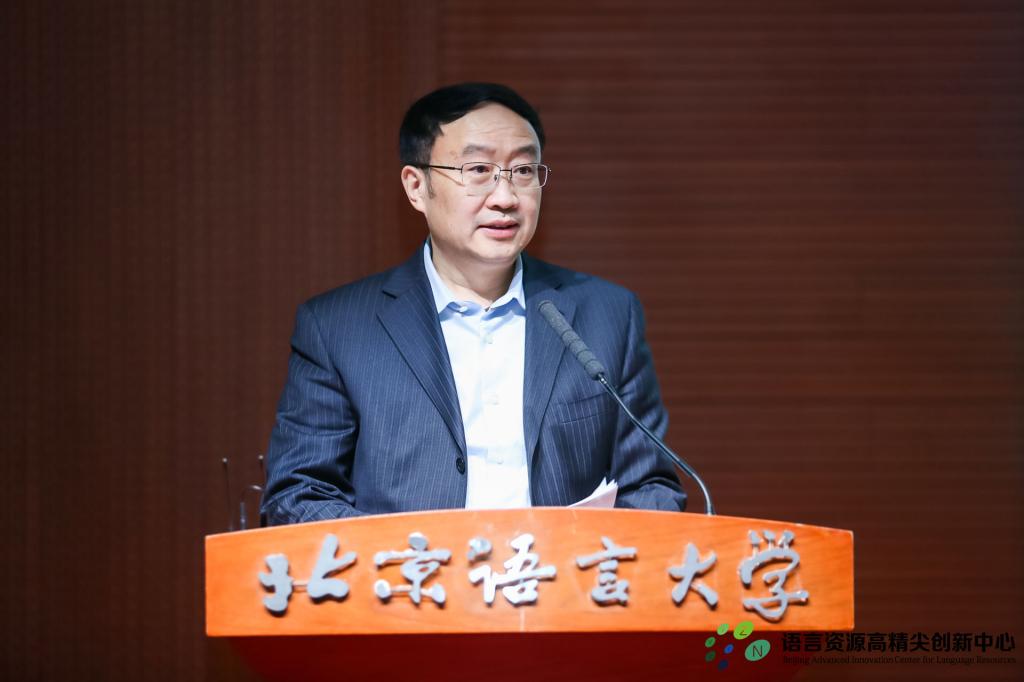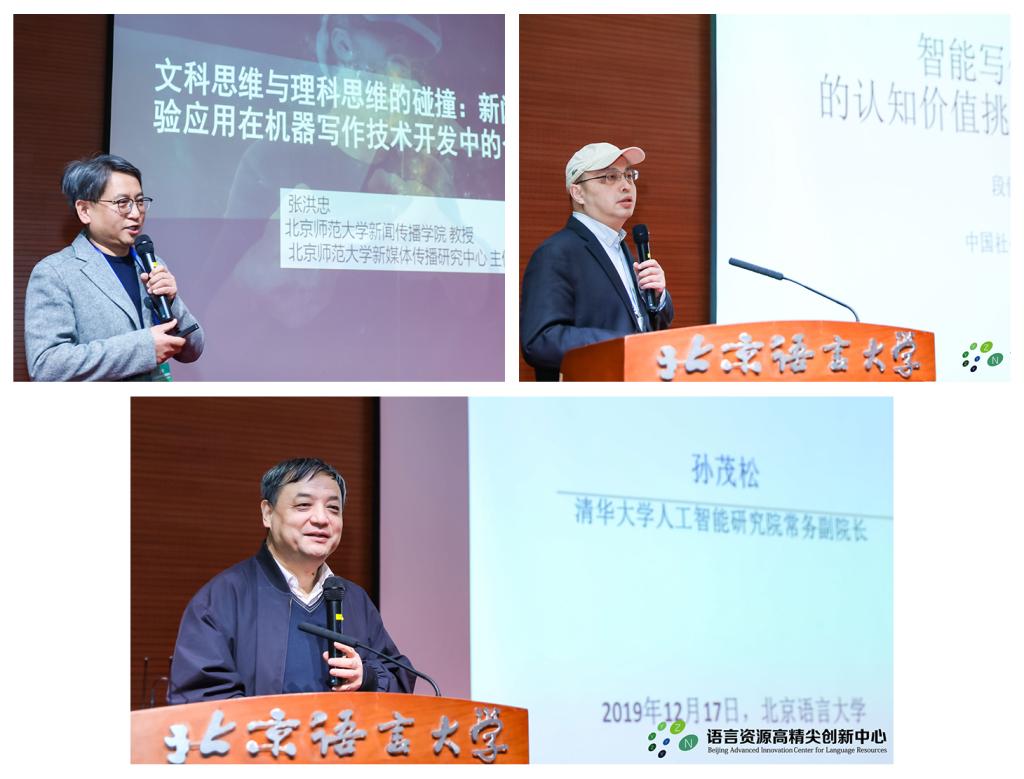On December 17, 2019, the 2nd Forum on Language Intelligence and Social Development was held in Run Run Shaw Auditorium, BLCU. The theme of the forum is "The Social Impact of Intelligent Writing and Its Ethical and Legal Issues". Lei Chaozi, Director of Department of Science and Technology, Ministry of Education, Ni Haidong, Chairman of the Council of BLCU, Zhang Wangxi, Vice President of BLCU attended the Forum and delivered speeches. More than 150 guests from the circles of linguistics, machine translation, media, and enterprises participated. The forum was co-organized by ACLR and SMP, Chinese Information Processing Society of China, and supported by the Research Institute of Language Intelligence, BLCU.

Lei Chaozi, Director of Department of Science and Technology

Zhang Wangxi, Vice President of BLCU
The forum includes 7 keynote speeches and 1 round-table discussion, focusing on the current development of artificial intelligence and social hot spots. Experts and scholars in related fields gathered together to express and share their ideas. Prof. Li Yuming, Director of ACLR made a keynote speech entitled Promoting Healthy Development of Intelligent Writing. He pointed out that intelligent writing has been widely used in many fields and exerted significant influence. However, it would bring real losses and ethical anxiety to the fields of industry and commerce, public management and cultural heritage if used without restriction. Faced with new technological changes, industry ecology and talent training in theare as of secretary, journalism and language education are being challenged. Professionals need to scientifically evaluate the role of intelligent writing in real language life, rationally predict its future development to help relevant practitioners adapt to the new business forms and new situation, and the government formulate practical industrial and educational planning. He called for the establishment of sound laws and regulations that manage and guidance the healthy developmentand application of intelligent writing.

Prof. Zhang Hongzhong, Director of New Media Communication Center, Beijing Normal University (BNU) made a report on The Collision ofHumanities and Technologies: A Case Study of Applying News Communication Experience to the Development of Machine Writing Technology. He introduced the development process of "Xiaobing White Box” writing assistant by Microsoft Xiaobing project team and a team of BNU, and explored the principle of automated generation of information-aggregated news text and the production mode of the template. Prof. Duan Weiwen, Director of the Research Center for Science & Technology and Society, Chinese Academy of Social Sciences, and Prof. Sun Maosong, Executive Vice Dean of the Institute of Artificial Intelligence of Tsinghua University, talked about the problems of intelligent writing and machine writing based on natural language generation with the reports on Cognitive Value Challenges and Ethical Adjustment in the Age of Intelligent Writing and Thoughts on Machine Writing respectively. Prof. Duan Weiwen believed that automated intelligent writing not only liberates all kinds of professional writing, but also leads to re-creation ofthe whole process of text generation and even knowledge production and dissemination in the cognitive field. His report presented a constructive strategy for value challenges. Prof. Sun Maosong initially explored three issues: whether machine writing is creative; how to define the intellectual property of the produced works if it is recognized as creative, and the ethical and moral bottom line that machine writing should pay attention to.

In the afternoon's keynote speeches, Prof. Liu Ting, Vice Dean of the Institute of Artificial Intelligence of Harbin Institute of Technology, Mr. Li Changliang, Vice President of Jinshan Group, and Ms. Shu Yi, Director of Knowledge Intelligence Part of Gridsum Holding Inc. respectively made reports on Intelligent Writing Technology and the Ethical and Legal Issues, Intelligent Writing in Office Scenes, and Legal Regulations on AI Generationsfrom the academic and application aspects. By summarizing the cases and problems of intelligent writing at home and abroad, Prof.Liu Ting expressed his views on the writing methods of intelligent robots, shared his opinions on the management of intelligent robots, and gave his thinking and conclusive suggestions on academic research, data security, algorithmic security, and policy guidance based on the current and domestic and foreign programmatic documents and academic research results on the ethics and legal aspects of AI. Vice President Li Changliang mainly introduced natural language processing technologies such as knowledge graph, text proofreading, intelligent Q&A, and how to help users improve writing efficiency in office. Director Shu Yi looked at the legal regulations on AI generations from the perspective of Chinese judicial practices. She discussed the legal ownership of the generated contents, the current legal norms on fake news and comments for shops generated by artificial intelligence, and the basic principles of how to regulate new technologies with law.

After that, Prof. Yang Erhong, Excutive Deputy Director of ACLR chaired the round table panel discussion on Power Intelligent Writing with Positive Energy. Prof. Feng Shizheng, Dean of the School of Sociology and Population Studies, Renmin University of China, Prof. Wang Chunhui, College of International Education, Capital Normal University, Dr. Zhou Hao, Researcher of AI Lab of Byte Dance, Associate Professor Zhang Lun, School of Art and Communication, Beijing Normal University, and Associate Professor Liu Zhiyuan, Department of Computer Scienceand Technology, Tsinghua University, fully exchanged their views on questions: What are the best applications cenarios for intelligent writing, What are the most frequently used, and more successful areas? For advertising, news and other fields, does intelligent writing only play a supporting role? Is it people that mainly do the modification and polishing? What are the potential negative effects of intelligent writing and how can it be eliminated at the source? In dealing with machine postings and the Internet water army, is there any suggestion from technical and humane perspective? Intelligent writing involves technology, language, communication, society and other fields, how to play the role of various fields to make it develop more healthily? Does the application and governance of intelligent writing require guidance and constraints with laws and regulations? The experts’points of view gained resonance from the audience.


In the end, Director Li Yuming made a closing speech. He stressed that scholars should shoulder academic responsibility to find problems and solve problems in social life, and among them, linguists should take solving social development problems and problems related to language life as their own concerns. Scholars should builda "revolving door" between the mand the government. Their research results should become an important reference for the decision-making of the government through think tanks and the "revolving doors". Prof. Li concluded by noting that in the age of artificial intelligence, human beings should be good at learning from machines so as to avoid being eliminated by society. Finally, he called on the experts and scholars on the scene to contribute wisdom to the Third Forum on Language Intelligence and Social Development in 2020!

The Forum has resulted in an important outcome, the 2019 Declaration of the Forum on Language Intelligence and Social Development, namely, Declaration on Promoting the Healthy Development of Intelligent Writing. The Declaration confirmed the five principles: "Embracing Intelligent Writing With A Positive Attitude", "Highlighting Social Attributes and Values," "AdvancingIn-depth Human-Machine Integration," "Following the Public Order and Social Customs of Human Language Life," and "Promoting Collaborative Development and Mutual Complementing" and proposed the following initiatives:
1. The overall goal of intelligent writing should be defined as to enhance the information exchange, knowledge heritage and sharing of human society, and to promote social harmony, cohesion and progress, in order to contribute to the community of shared future for mankind.
2. During its development, intelligent writing should be people-oriented, take public welfare as its goal, respect for social, and scientific and technological ethics, and shoulder social responsibilities. It should also safeguard the dignity, privacy and rights of individuals and organizations. Intelligent writing should always be treated as a tool, never seek to replace or weaken the language ability of human beings. Transparency, interpretability and predictability of the intelligent writing should be constantly improved, so as to make it traceable, verifiable and accountable.
3. During its application, Intelligent writing should be in line with human values and the overall social interests. This includes but not limited to that intelligent writing should use standardized language, disseminate real information, reject language violence, avoid language bias, not actively change the form and order of human language life. Applications should becarefully selectedto reduce repetiti on works and serve human life. Intelligent writing shouldnot disturb social order, interfere with personal life, or provide overloaded information. It should make clear its non-human identity and provide dataon developers, users, etc. and highlight these information. The intellectual property rights of human language works should be respected, and those of "original" language works should be handled prudently.
4. During the governance of intelligent writing, the industry should report the development of intelligent writing realistically, do not exaggerate the performance, do not make prospect without scientific basis, do not mislead the society, and do not artificially create social anxiety in its publicity and popularization; The professions such as secretary, journalism and language education should keep pace with the times, take the challenge of intelligent writing as an opportunity for transformation and development, treat the instrumental and humane features of language education dialectically, and attach importance to the study and application of language intelligence technology. In the meantime, laws and regulations should be resorted to regulate the development and application of intelligent writing. Responsibilities and obligations between intelligent writing developers, users and recipients should be clarified. Positive interaction among technology development, market application and ethical supervision should be enhanced, and the abuse of intelligent writing to harm the rights and interests of society and individuals shouldbe prohibited.
5. The Forum calls on the communities of information science, linguistics, ethics, media and communication, the jurisdiction and other relevant sectors to set up a "Language Intelligence Ethics Committee" to ensure that language intelligence develops within the frame of human ethics and to define the moral and legal boundaries of the application of language intelligence technology.
Initiated and launched byACLR and HIT-SCIR (Social Computing and Information Retrieval, Harbin Institute of Technology), the Forumon Language Intelligence and Social Developmentis proposed to be held on a regular basis. In 2018, the first forum was successfully convened at which the Declaration on the Coordinated Development of Language Intelligence and Foreign Language Education was released. In 2019, with a new topic, the coordinating organizations will further strengthen overall cooperation, continue to advance the development of language information technology in the new era, and propel the healthy development of language intelligence.